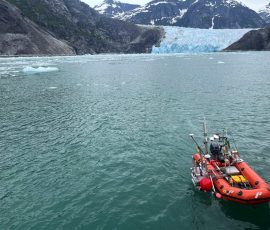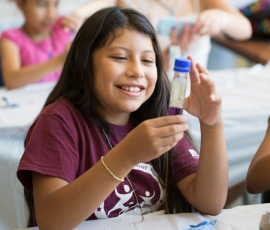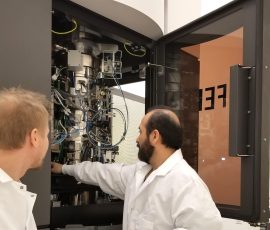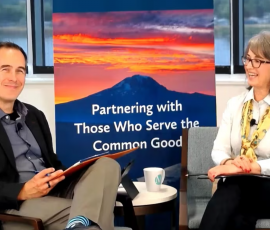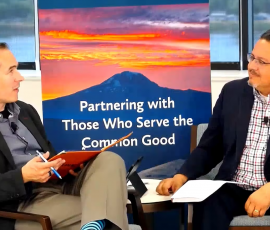In the heart of Boise lies the only Anne Frank memorial in the United States. A bronze statue of Anne Frank herself peers through the curtains of her hiding place at the center of the memorial, a book hidden behind her back. A wall of quotes from human rights activists throughout history circles this centerpiece, and to one side lies a sapling from the Anne Frank Chestnut Tree in Amsterdam. On the wall next to this sapling, a quote from Bill Wassmuth, a Catholic priest and human rights activist, is displayed: “Saying ‘yes’ to human rights is the best way to say ‘no’ to prejudice.”
It is this spirit of advocacy for human rights and human dignity, expressed in the memorial and Wassmuth’s quote, that motivates the work of the Wassmuth Center for Human Rights.
Saying Yes to Human Rights
The Idaho Anne Frank Human Rights Memorial engages visitors to confront both the triumphs and tragedies of our history and foster conversations about human rights. As the educational accompaniment to the memorial, the Wassmuth Center continues this conversation through programs and resources that promote respect for human dignity and diversity.
Here are some of the ways the Center says ‘yes’ to human rights, and encourages constituents to do the same:
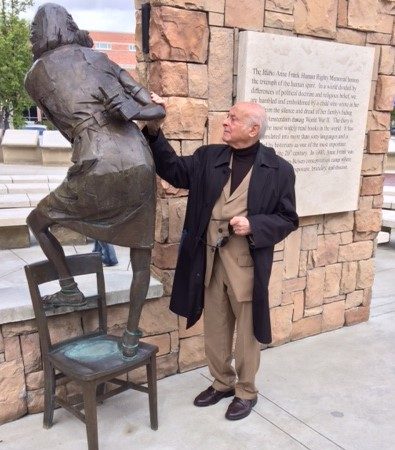
- The Human Rights Art Contest, open to all K-12th grade Idaho students, and the Human Rights Poetry Contest, open to all 6-12th grade Idaho students, encourages students to reflect on article #1 of the Universal Declaration of Human Rights through original artwork or poetry.
- A Human Rights certification course that deeply explores themes of diversity, inclusion, ethics, civility, respect, and more.
- A “Voices of Idaho” podcast series and “Faces of Idaho” poster series that put a voice and a face to human rights issues in Idaho.
- An “Equal in Dignity and Writes” program that explores the work of 12 important figures in the fight for human rights, including Martin Luther King, Jr., Malala, Anne Frank, Helen Keller, Gandhi, and more.
- A Memorial Service Learning Project in which students organize school, class, or club tours of the space, becoming young ambassadors for Holocaust education and remembrance.
- Webinars, resources, and scholar series on topics such as confronting antisemitism and racism, justice after genocide, and more.
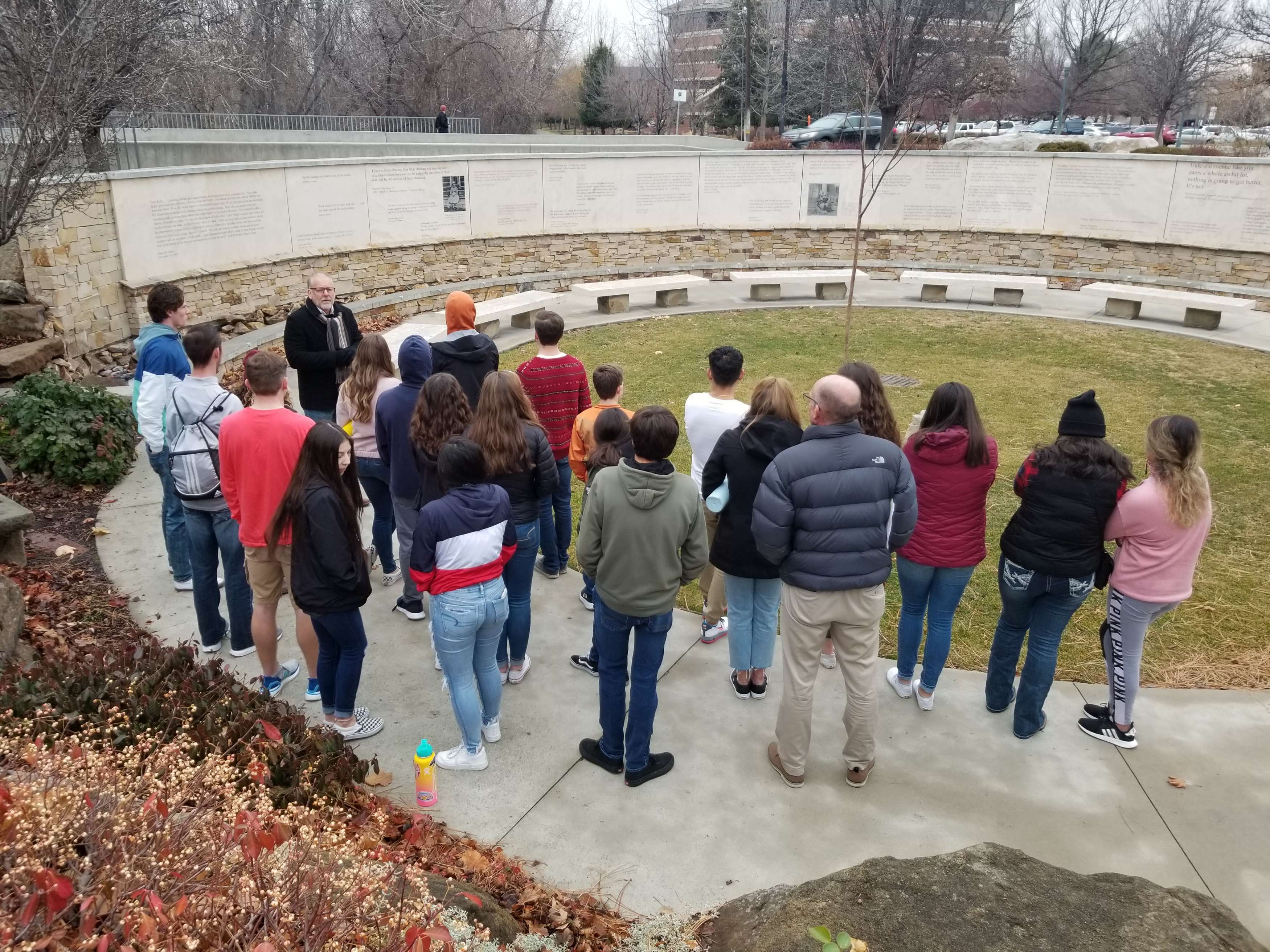
Making the Memorial
“We began out of an exhibit to Anne Frank that was traveling the United States in 1995,” said Dr. Dan Prinzing, executive director of the Center. “It was really the genesis from that exhibit that gave birth to the Memorial, and years of fundraising.”
Seven years of fundraising later, the Memorial opened in 2002. Today, the Memorial is recognized as an International Site of Conscience and is visited by more than 120,000 people annually, including more than 7,500 K-12 and university students who participate in docent-led tours each year.
“When I first came [to the Memorial],” remembers one student, “I probably spent an hour or two, just reading all the things on the wall. And I left and I said ‘Wow, how have I not known this was here?’”
“It really puts things in perspective,” another student recounts. “I saw my life in a different way.”
It is for these kinds of transformative experiences, for encountering some of history’s greatest voices and seeing our own stories within the triumphs and tragedies of our collective history, that the Memorial was created.
Creating the Center
In 2007, the Center, which is considered the educational arm of the Memorial, moved from a single room to a larger, adjacent site. Several years ago it had the opportunity to expand once again. Today, the future is even brighter for the Center, with plans to serve as a public meeting place and education resource complete with research library, conference room, kitchen area, exhibit space, and more. In November 2021, Center staff and community members gathered for a ceremonial groundbreaking of the new facility, to be completed in 2022, and certain to make a lasting difference for years to come.
“[The Murdock Trust] believed in that vision of what the Memorial would be and supported us for several years in programming,” said Dr. Prinzing on the day of the groundbreaking. “Then [they] came back and said ‘Now, what is the next step?’ And that’s what we saw happening today: the groundbreaking of the Marilyn Schuyler Classroom for Human Rights.”
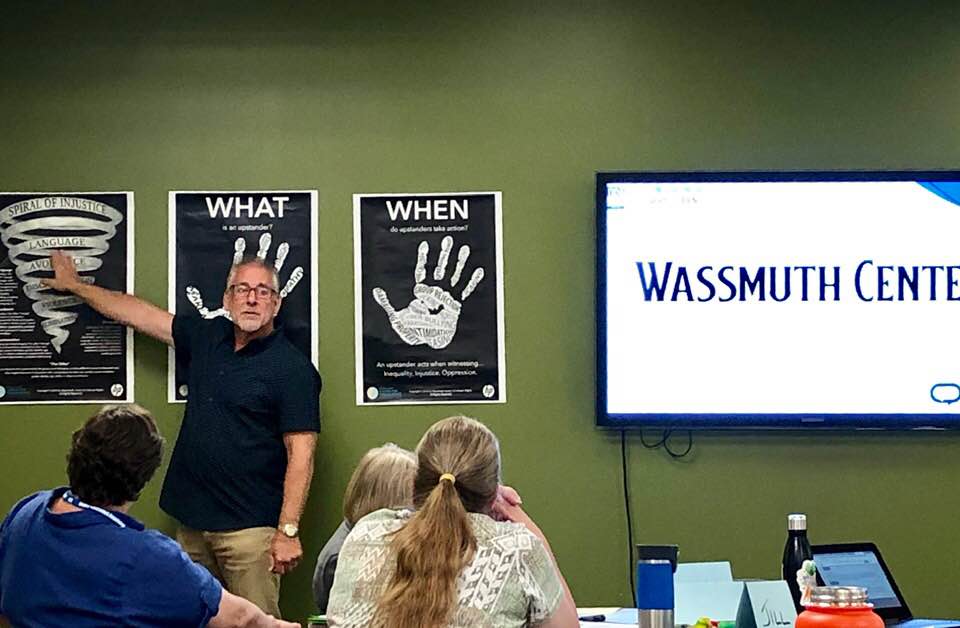
The Murdock Trust could not be more grateful to be part of this journey. We have been fortunate to partner with the Center for over 20 years, through grants supporting the creation of the Memorial, the development of an international education program, an outdoor classroom, and most recently, the construction of the Marilyn Schuyler Classroom for Human Rights.
As Dr. Prinzing remarked, “We’ve often said that the Memorial is there to cause us to talk with one another, to reflect, to really create this thought process of who and what are we, and how do we treat one another? And that is the vision that the Murdock Trust saw from the beginning and that’s why we have been so pleased that they have supported us throughout this journey.”
To the Wassmuth Center for Human Rights and so many other organizations promoting dignity, diversity, and human rights for all across our region, we say thank you. You inspire us all to learn from history’s greatest voices as we work toward a brighter future where every individual, family, and community has the opportunity to flourish and thrive.
After all, in the words of Anne Frank, “How lovely to think that no one need wait a moment, we can start now, start slowly changing the world.”


